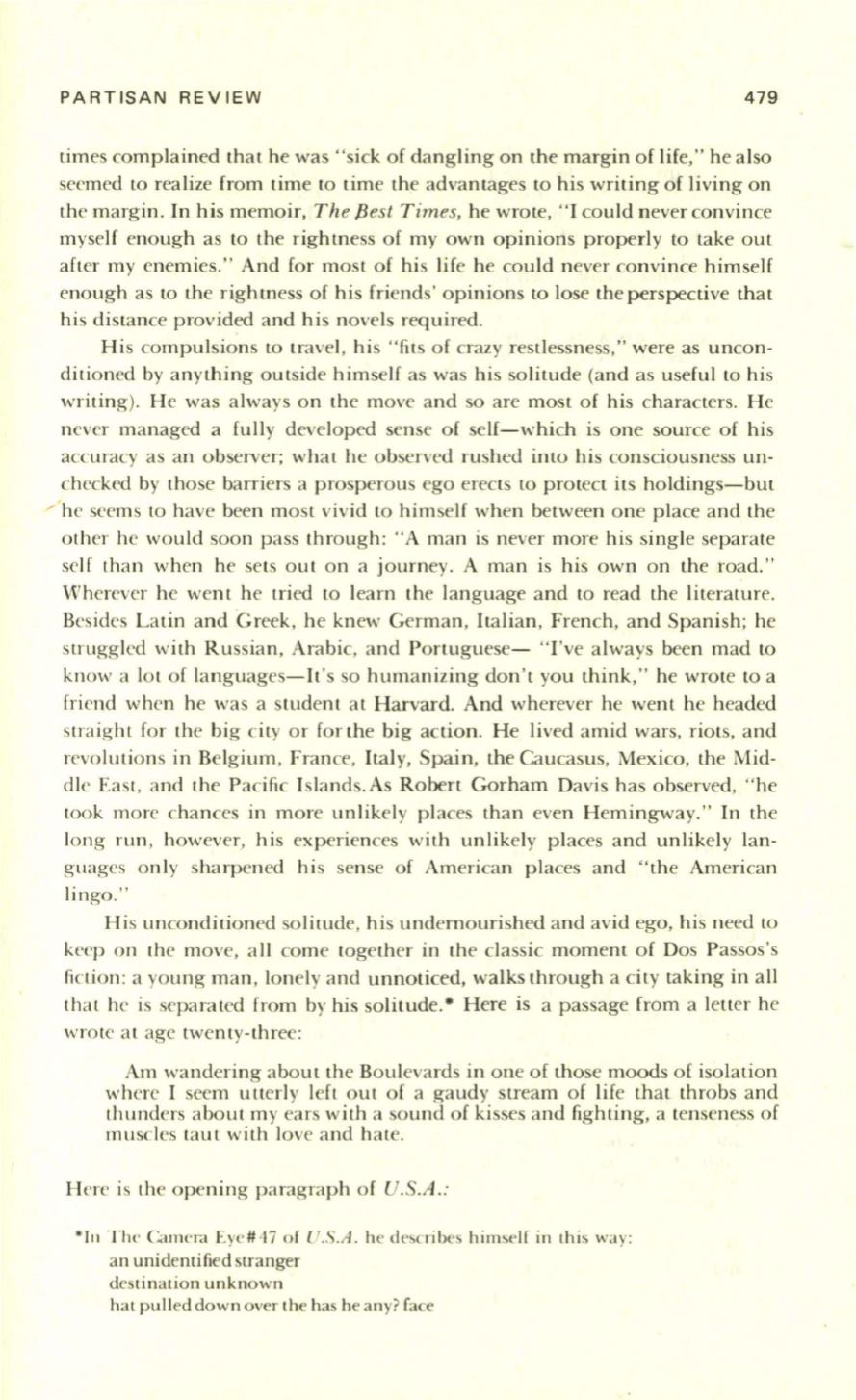
PARTISAN REVIEW
479
times complained tha t he was "sick of dangling on the ma rgin of life," he also
seemed
to
rea lize from time to time the advantages
to
his writing of living on
the ma rg in . In his memoir,
Th e Best T imes,
he wrote, " I could n ever convince
myself enough as to the rightn ess o f my own opinions properly to take out
after my enemies." And for mos t of his life he could never convince himself
enough as
to
the rightness of his fri ends' opinions
to
lose the perspective tha t
hi s distance provided and h is novels req uired.
His compulsions
to
travel, his " fits of crazy restlessness," were as uncon–
ditioned by anything outside himself as was his solitude (and as useful
to
his
writing). He was a lways on the move and so are mos t of his cha racters. He
never managed a full y developed sense of self-which is one source o f his
accuracy as an observer; wha t he observed rushed into hi s con sciousness un–
checked by those ba rriers a prospero us ego erects
to
pro tect its holdings-but
/ he seems
to
have been most vivid to himself when between o ne place and the
oth er he would soon pass through: "A man is never more hi s sing le sepa rate
self than when he sets o ut o n a journey. A man is his own on the road. "
Wherever he went he tri ed
to
lea rn the lang uage and
to
read the litera ture.
Bes ides La tin and Greek, he kn ew German, Ita lian , French, and Spani sh; he
struggled with Russ ia n , Arabic, and Portuguese- ' 'I've a lways been mad to
know a lo t o f lan guages-It's so humanizing don 't you think ," he wrote
to
a
fri end when he was a student a t Harvard. And wherever he went he headed
stra ight for the big city o r fo rthe big aClion. He lived amid wa rs, rio ls, a nd
revo lutions in Belg ium, France, Italy, Spa in, the Caucasus, Mexico, the Mid–
dl e East, and the Pacific Islands. As Robert Gorham Davi s has observed, " he
look mo re cha nces in mo re unlikely pl aces than even Hemingway." In the
long run , however, his experiences with unlikely places and unlikely lan–
g uages o nly sha rpen ed hi s sense of Ameri can places and " the Ameri can
lingo."
His unconditio ned so litude, his undernourished and av id ego, his need
to
keep o n the mo ve, a ll come together in the classic moment o f Dos Passos's
fi cti on : a young man , lonely and unnoticed, walks through a city taking in a ll
tha t he is sepa ra ted from by his solitude. · Here is a passage from a letter he
wro te a t age twenty- three:
Am wa ndering abo ul the Boul evards in one of those moods o f isolation
where I seem utterly left o ut o f a ga ud y stream of life that throbs and
thunders abo ut my ea rs with a sound of kisses and fi ghting, a tenseness o f
mu scles ta u t with love and h a te.
H ere is th e opening p a ragraph o f
U.S. A .:
· 1"
The C llllera Eyc # '17 of
U.S.A.
he de,cribes himse lf in this way:
an unidentified stranger
destination unknown
hat pull ed down over the has he any? face


